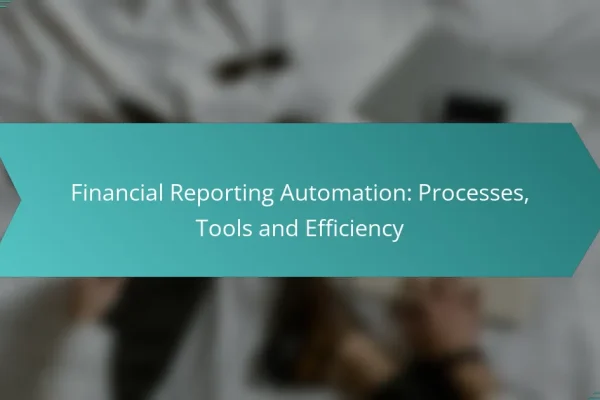What are the best practices for corporate expense management in the US?
Best practices for corporate expense management in the US involve implementing systems and policies that enhance efficiency, compliance, and transparency. Companies should focus on automation, clear guidelines, employee training, effective software tools, and regular audits to optimize their expense management processes.
Implementing automated expense tracking
Automated expense tracking streamlines the process of recording and managing expenses, reducing manual errors and saving time. By using tools that integrate with company credit cards and accounting software, businesses can capture expenses in real-time, ensuring accuracy and compliance with financial reporting standards.
Consider solutions that offer mobile apps for employees to submit expenses on-the-go, which can enhance compliance and reduce delays in processing. Look for features like receipt scanning and automatic categorization to simplify the tracking process further.
Establishing clear expense policies
Clear expense policies provide guidelines on what constitutes an allowable expense, helping to prevent misunderstandings and misuse of funds. These policies should be well-documented, easily accessible, and communicated to all employees to ensure everyone understands the rules.
Include specific details such as spending limits, approval processes, and documentation requirements. Regularly review and update these policies to reflect changes in business needs or regulations, ensuring they remain relevant and effective.
Regular training for employees
Regular training ensures that employees are aware of the expense management policies and procedures. Training sessions can cover how to submit expenses, the importance of compliance, and the use of any expense management tools.
Consider offering refresher courses annually or whenever there are significant updates to policies or systems. Engaging employees through interactive workshops can enhance understanding and retention of the material.
Utilizing expense management software
Expense management software simplifies tracking, reporting, and analyzing expenses. Look for solutions that offer features such as real-time reporting, integration with accounting systems, and customizable dashboards to meet your company’s specific needs.
Evaluate options based on user-friendliness, customer support, and scalability. Many software solutions offer free trials, allowing you to assess their effectiveness before making a commitment.
Conducting periodic audits
Periodic audits of expense reports help identify discrepancies, ensure compliance, and reinforce accountability among employees. Establish a regular schedule for audits, such as quarterly or bi-annually, to maintain oversight on spending practices.
During audits, review a sample of expense reports for accuracy and adherence to company policies. Use findings to improve processes and provide feedback to employees, fostering a culture of transparency and responsibility in expense management.
How do financial reporting standards impact expense management?
Financial reporting standards significantly influence expense management by establishing guidelines that ensure transparency and consistency in financial reporting. Adhering to these standards helps organizations accurately track and report their expenses, which is crucial for effective budgeting and financial analysis.
Compliance with GAAP requirements
Compliance with Generally Accepted Accounting Principles (GAAP) is essential for U.S.-based companies as it dictates how expenses should be recognized and reported. This includes guidelines on accrual accounting, which requires expenses to be recorded when incurred, not necessarily when paid.
Organizations must ensure their expense management processes align with GAAP to avoid discrepancies in financial statements. Regular audits and internal reviews can help identify areas of non-compliance, which can lead to financial penalties or reputational damage.
Impact of IFRS on reporting
The International Financial Reporting Standards (IFRS) affect expense management for companies operating internationally or those that report under IFRS. Unlike GAAP, IFRS allows for more flexibility in expense recognition, which can impact how expenses are categorized and reported.
For instance, under IFRS, companies may have different criteria for capitalizing versus expensing costs, which can influence financial ratios and overall financial health. Organizations should stay informed about IFRS updates and consider their implications on expense management practices to ensure accurate reporting and compliance.
What tools are available for expense management?
Various tools are available for corporate expense management, each designed to streamline the tracking, reporting, and reimbursement processes. Selecting the right tool depends on your organization’s size, specific needs, and budget considerations.
Expensify for expense tracking
Expensify is a popular tool that simplifies expense tracking through features like receipt scanning and automatic categorization. Users can easily upload receipts via mobile devices, and the software will extract relevant data, reducing manual entry time.
Consider using Expensify if your organization requires quick expense reporting and integration with accounting software. It offers various pricing tiers, making it suitable for both small businesses and larger enterprises.
Concur for travel and expense management
Concur is a comprehensive solution for managing travel and expenses, integrating booking and expense reporting into one platform. It allows users to book travel directly and automatically sync expenses, which can streamline the reimbursement process.
Organizations that frequently manage employee travel may find Concur beneficial due to its robust reporting and compliance features. However, it may come with higher costs, so assess your budget against the potential efficiency gains.
Zoho Expense for small businesses
Zoho Expense is tailored for small businesses, offering an affordable solution for expense reporting and management. It includes features like multi-currency support, which is useful for businesses operating internationally.
This tool allows for easy expense approval workflows and integrates well with other Zoho applications. Small businesses should consider Zoho Expense for its cost-effectiveness and user-friendly interface, ensuring a smooth expense management experience.
What are the key financial reporting standards to consider?
The key financial reporting standards to consider in corporate expense management include ASC 842 for leases and FASB guidelines for expense recognition. Understanding these standards helps organizations accurately report their financial obligations and expenses, ensuring compliance and transparency.
Understanding ASC 842 for leases
ASC 842 is a standard that governs how companies should recognize, measure, and present lease transactions on their financial statements. Under this standard, organizations must recognize lease liabilities and corresponding right-of-use assets for most leases, which can significantly impact balance sheets.
When implementing ASC 842, companies should assess all lease agreements, including operating and finance leases, to determine their financial implications. For example, a company leasing office space will need to record the present value of future lease payments as a liability, which may affect financial ratios and covenants.
FASB guidelines for expense recognition
The FASB guidelines for expense recognition dictate when and how expenses should be recorded in financial statements. These guidelines emphasize the matching principle, which states that expenses should be recognized in the same period as the revenues they help to generate.
To comply with these guidelines, companies should establish clear policies for recognizing expenses, including direct costs and overhead. For instance, a business should recognize the cost of goods sold at the time of sale rather than when the inventory is purchased. This approach ensures that financial statements accurately reflect the company’s performance and financial position.
How can companies ensure compliance with financial reporting standards?
Companies can ensure compliance with financial reporting standards by implementing structured processes and regular evaluations. This involves ongoing training for employees and collaboration with external auditors to maintain adherence to regulations and best practices.
Regular training on standards
Regular training on financial reporting standards is essential for all employees involved in financial processes. This training should cover the latest regulations, reporting requirements, and internal policies to ensure everyone is up to date.
Consider scheduling training sessions at least once a year, with refresher courses every six months. Incorporating real-world scenarios and case studies can enhance understanding and retention of the material.
Engaging external auditors
Engaging external auditors provides an objective assessment of a company’s compliance with financial reporting standards. These auditors can identify gaps in processes and offer recommendations for improvement.
It is advisable to conduct audits annually or biannually, depending on the company’s size and complexity. Choose auditors with experience in your industry to ensure they understand specific regulatory challenges and can provide tailored advice.
What are the common challenges in corporate expense management?
Corporate expense management often faces challenges such as ensuring employee compliance and preventing fraud. These issues can lead to financial discrepancies and inefficiencies if not addressed effectively.
Managing employee compliance
Ensuring employee compliance in expense management requires clear policies and consistent communication. Organizations should establish guidelines that outline acceptable expenses and the documentation required for reimbursement.
Regular training sessions can help employees understand these policies better. Additionally, implementing user-friendly expense management software can streamline the submission process, making it easier for employees to comply.
Dealing with fraud and misuse
Fraud and misuse in corporate expenses can significantly impact a company’s bottom line. To mitigate these risks, companies should adopt a multi-layered approach that includes monitoring and auditing expense reports regularly.
Utilizing technology such as AI-driven analytics can help identify unusual spending patterns. Companies should also encourage a culture of transparency, where employees feel comfortable reporting suspicious activities without fear of retaliation.












